Graduate Education in Biomedical Sciences
- Overview
- Admissions
- Degree Programs
- Visits, Info Sessions, and Events
- Meet our Faculty
- Meet our Staff
campus portal

GEBS Students
Unsure about a certain program? Confused about where your talents and passions will be best served? Click on a photo below to get real first-hand knowledge & experience from our current GEBS students.
B.S./M.S. in Neuroscience
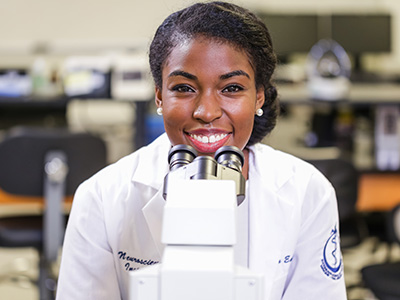
Jasmin Eatman
Hello, I'm Jasmin. Very nice to meet you!
I am currently a senior neuroscience major and dance minor attending Spelman College. I am enrolled in a dual degree Bachelor and Master of Neuroscience program at Morehouse School of Medicine.
There exists an irrefutable relationship between scientific research and community health. I look forward to developing my career at this junction through research in neuroscience clinical practice. Today, I dedicate myself to the pursuit of academic excellence, because I want my work in human developmental research to be undergirded by expertise in the field of neuroscience. In the near future, I will address the challenge of research in infant mortality within communities of color by applying the biological principles of neurotoxicity in order to assess the impact of urban environmental air quality and perinatal exposure to combinational metal toxicity on fetal neurodevelopment. I am currently conducting research in combinational metal neurotoxicity in the department of Pharmacology and Toxicology at Morehouse School of Medicine under the leadership of Kennie Sheperd, Ph.D. My future academic aspirations include receiving my Master of Neuroscience and pursuing a M.D. degree in order to serve as a primary care physician. My research findings and work as a physician will ultimately instigate strategies that will be used to eliminate disparities in premature birth and infant mortality due to exposure to environmental contaminants in disenfranchised communities, nationwide.
Few programs have offered a reflection of the incredible support that I have received as a member of the B.S./M.S. Program in Neuroscience at Morehouse School of Medicine. At this point, I feel well-equipped in my pursuit of graduate education, even as I complete my work at the undergraduate level.
I’m here if you have any questions about #RealLife: What It’s Like to Be a MSM Student!
jeatman@msm.edu
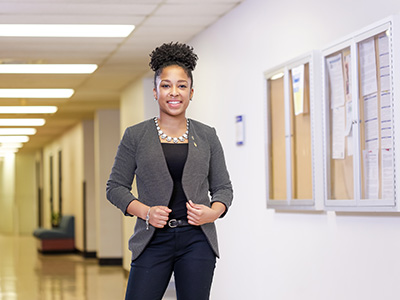
Asia Payne
I recently attended a research conference and was able to hear wise words from a physician scientist conducting biomedical research. He stated, ‘I became a researcher because whenever I hear someone say, “Maybe someone will discover a cure for that one day”, I want to be that someone’. These words summed up the reason why I too became interested in biomedical research. I come from a family that has had neuroscience books around the house since I was a young child. My mother was always searching for answers when it came to understanding the neurological issues a family member had. Therefore, as I got older, I naturally took the path to search for answers and soon fell in love with the (still) unchartered territory known as the human brain.
It didn’t come as a surprise that when I learned about the B.S./M.S. Neuroscience degree program at Morehouse School of Medicine that I jumped at the opportunity to learn more about the field that I always had a profound interest in. Although the material was challenging at first, I thankfully had the support of the professors in the Neuroscience department and could visit their offices anytime for questions.
Now as a senior at Spelman College, I look forward to encouraging more students to pursue Neuroscience if they have an interest in the field. After completion of this program, I plan to enter an M.D./Ph.D Program in which I will be able to conduct translational research in Neuroscience.
I’m here if you have any questions about #RealLife: What It’s Like to Be a MSM Student!
apayne@msm.edu
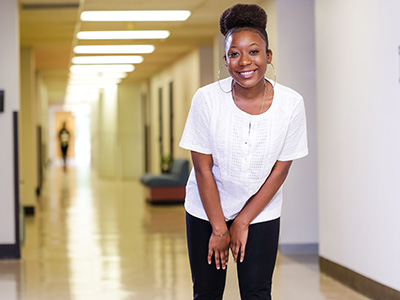
Parris Washington
Hello! My name is Parris and I am a senior Neurobiology dual degree major at Spelman College and Morehouse School of Medicine (MSM). I can recall sending my younger brother to the hospital for making him my ‘subject’ in one of my infamous ‘science experiments’ and looking at ‘samples’ with my microscope set from Walmart. I always knew that I wanted to pursue a career in the sciences. However, I didn’t quite understand how to articulate that desire until I matriculated into Spelman, and discovered that a fellow HBCU next door, Morehouse School of Medicine provided that opportunity. I was under the impression that the only way to pursue the sciences was to become a medical doctor or a teacher. My sophomore year changed my mindset, as I was invited into a lab to work on my own research project. I hit the ground running and haven’t stopped since. I had the opportunity to be a part of this program at MSM and fell in love. I hope to pursue an M.D/Ph.D. dual degree in the future at Morehouse School of Medicine with its Neuroscience Institute, which is providing me with the skills and training to do so. Beyond pursuing my dual degree, the thing closest to my heart is encouraging and supporting young Black women to venture into STEM (Science, Technology, Engineering, and Mathematics). In my own experience, I didn’t have a formal science class until seventh grade and my idea of a scientist, for a very long time, was based on the 1990’s TV show Bill Nye the Science Guy. For so many young Black girls, good science and the encouragement of healthy exploration has been withheld for so long, particularly in underserved communities. Interest and curiosity has been diminished by lack of exposure, and consequently, when science is finally reintroduced, it can be an obstacle to tackle with social stigmas and missing fundamentals working against the student. However, whether it is through mentorship, tutoring, or exposure to amazing Black women in STEM, Black women are doing amazing things in STEM and young Black girls deserve to know that because representation matters.
I’m here if you have any questions about #RealLife: What It’s Like to Be a MSM Student!
pwashington@msm.edu
M.S. in Biomedical Research
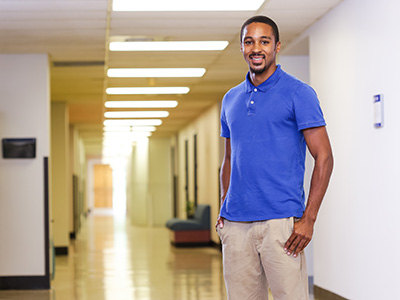
Kristopher Ballou
Since entering the Master of Science in Biomedical Research program (MSBR) program at Morehouse School of Medicine, my enrichment as both a student and a scientist has expanded immensely. Within the first year of enrollment, the courses and work schedule of this program will surprise you in a way that it greatly elevates you to the next level. The professors conducting research in so many fields of study come together to bring specialized focus on the numerous topics covered in our different core subjects. Fundamental classes, such as Human Biology and Biochemistry, go extremely in depth to bring forth knowledge on the functions of the entire human body, its systems, organization, and molecular pathways. The lab classes accompanying these courses allow us as students to apply what we learn in these areas to the field of research while presenting us an opportunity to improve our research techniques, increasing our chances to produce the best results. At the same time, classes such as Critical Thinking and Scientific Integrity work hard to polish our problem solving skills and judgments on critical health issues so that we are able to address these issues with a positive and ethical response.
I decided to focus my studies and career path in biomedical research because I saw it as a means of early primary prevention to many causes of death and disease in our lives. While there is plenty of knowledge and work done in the medical field to treat and cure many of these disparities as they happen, little information is known amongst the general public about the sources of these disparities and their methods of manifestation. Biomedical research is not just a way for me to build on things that I learned from Biology; it is also a way for me to figure out how to create and spread awareness of more primary prevention methods, which is something I plan to do in underprivileged communities. MSM faculty and advisors are working just as hard towards this goal every day, not only by teaching and equipping us for mastery of the subjects in our field, but also by making themselves personally invested in our goals and introducing us to professionals from outside the School that are on the same path.
I’m here if you have any questions about #RealLife: What It’s Like to Be a MSM Student!
kballou@msm.edu
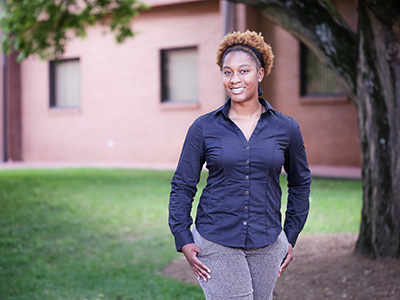
Brittany Bush
I am a second year student in the Master of Biomedical Research (MSBR) degree program, completing my thesis in the Neuroscience Institute at Morehouse School of Medicine (MSM). I am focusing my studies in biomedical research to fulfill the passion of advancing scientific knowledge on diseases and disorders that affect human kind, and more specifically, minorities. When I started my journey in the sciences, I only wanted to be a gynecologist, but as time passed, my thoughts began to evolve into, not only being in the foreground as a physician, and moving more into the preface of the health and medical problems that minorities face. I wanted to pursue a research-based degree before entering into medical school and I made my decision to attend Morehouse School of Medicine for that reason; I knew the faculty would foster my vision for performing research and becoming a physician. The faculty at Morehouse School of Medicine has always been helpful in guiding me toward the next step in my career path, whether it involves my academic career or my future career goals. They continuously keep me focused on what my end goal is and make sure that I am taking the proper steps in achieving my dream career.
My classmates and I always discuss how we want to leave our marks at MSM. My goal, along with my classmates, has always been to change the outlook on the sciences for the youth in underserved communities. We have begun to make plans to create different programs for young women in need of guidance from experienced women who are eligible and capable to educate and empower them on who they can be and what they can do in life. This program is solely centered around young women, but all women, in need of direction in relation to their futures. Overall, my time at MSM so far has been challenging, yet rewarding, to say the least. The connections and growth I have experienced thus far is nothing less than amazing, and the sky’s the limit from here while I continue my studies at Morehouse School of Medicine.
I’m here if you have any questions about #RealLife: What It’s Like to Be a MSM Student!
bbush@msm.edu
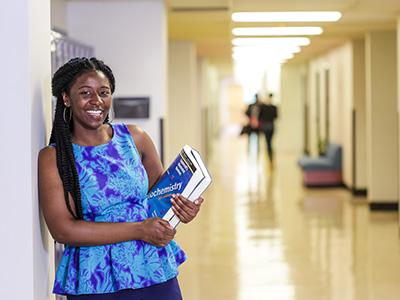
Sha’kayla Nunez
I am a second year student currently pursuing my Master’s degree in Biomedical Research. Conducting research, whether individually or as a team member, has allowed me to enhance my knowledge and gain experience in the field of biomedical sciences. I am motivated to know more about cancer beyond the information I learn in the classroom, read about, or listen to from public propaganda. It is my passion to study and understand the necessary, groundbreaking, and novel methods of how to treat people and find cures that are essential to living a healthy life. My passion to provide means of saving lives is motivated by others who save lives, such as the doctor who saved the life of my mother from cancer. Battling with my mother’s diagnoses of breast cancer during my senior year of high school was a struggle because two years prior, my uncle lost his life to throat cancer. I was initially oblivious to knowing how cancer operated, but with independent self-motivated research I later learned that cancer is defined as: ‘uncontrolled division of abnormal cells in a part of the body.’ To the average person, such a simple definition implies a simple solution; however, I have come to understand that a solution is not this simple. Watching my mother fight and survive this ‘uncontrolled cell division’ fostered my passion of wanting to be behind the work of the scientists who help fight cancer and give hope of a cure. During my first year at Morehouse School of Medicine, while working with my peers and by the mentorship of faculty in classes, I learned that teamwork divides the task and multiples the success. Seeking help from my instructors has advanced my progress and success. This institution has granted me the opportunity to work in an area that provides a strong foundation and advanced training in biomedical sciences. This program also provides me assurance that I will obtain expertise to contribute knowledge and also highly competitive skills to improve health disparities in arenas of cancer. Morehouse School of Medicine has also influenced my personal growth by providing confidence that has been achieved by competitive accomplishments and practical mentorship. Additionally, I hope that my passion to improve health conditions will contribute to unraveling cures and progress treatments amongst cancer that have previously left the scientific community mystified.
I’m here if you have any questions about #RealLife: What It’s Like to Be a MSM Student!
snunez@msm.edu
M.S. in Clinical Research
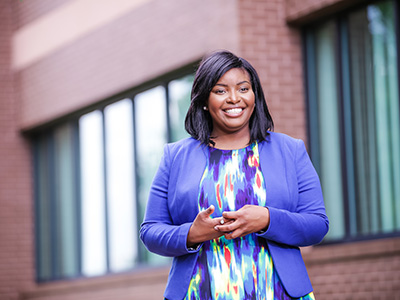
Alexus Footman
Being raised in a family dedicated to humanity and service, it was destined for me to become an avid volunteer in the community. It became my mission to one day be the change I wish to see in the world, and that change was for health equity to be achieved- for those in underserved communities to have the same quality, accessibility, and attention as those in more developed communities.
Deciding to attend Morehouse School of Medicine (MSM) was a ‘no-brainer!’ Morehouse School of Medicine’s mission to improve the overall wellness of underserved communities through education, research, and service was parallel to my own mission of one day being able to hopefully witness the eradication of health disparities. As a second year candidate of the Master of Science in Clinical Research (MSCR) program, I am able to polish my clinical and translational research skills in addition to expanding my knowledge on health disparities and how to address them.
I will be eternally grateful for Morehouse School of Medicine and the faculty/staff in the Graduate Education Biomedical Sciences (GEBS) department for molding me and preparing me to be a well- rounded clinician one day. Thanks to the GEBS program and the environment at MSM, I have been equipped with the essential scientific skills, knowledge, support, and motivation to continue my goal of one day providing accessible health care in underserved urban and rural populations. The acquired knowledge and skill set developed from the MSCR program will be used as a fundamental building block for me to not only one day diagnose illnesses, but how to conduct the proper research to cure the patients as we advance into personalized medicine. Thank you: Morehouse School of Medicine, GEBS staff/faculty, MSCR staff/faculty, and my incredible mentor, Veena Rao, Ph.D. and the Cancer Biology Research group in the department of OB/GYN at Georgia Cancer Center for Excellence, a Morehouse School of Medicine satellite site at Grady Memorial Hospital in Atlanta.
I’m here if you have any questions about #RealLife: What It’s Like to Be a MSM Student!
afootman@msm.edu
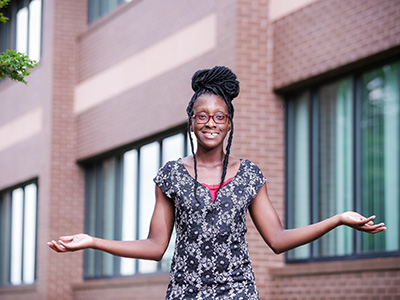
Tameka Lawrence
I graduated from Morehouse School of Medicine’s (MSM) Master of Science in Clinical Research (MSCR) training program in May 2015. I chose to apply to MSM based on the mission statement’s focus on caring and serving the underserved and underrepresented populations. Coming from a basic research background with a Bachelor’s degree in Chemistry, I was looking for an opportunity to learn more about community-based research. I was also seeking an opportunity to learn effective methods for engaging the community in the research process.
Upon my acceptance into the MSCR program, I quickly discovered how dedicated MSM faculty truly is to the School’s mission and to the professional development of future researchers. Specifically, my mentors guided me in developing my research project, ensured I understood the necessary concepts, and allowed me to explore research questions I was interested. My mentors trusted my judgement and allowed me to grow into the researcher I am today. Because of the invaluable lessons learned and experiences experienced in the MSCR program, I have been afforded the opportunities to network with different researchers and give back to the community by volunteering in various organizations.
As an alumna, my mentors, Folashade Omole, M.D. and Gregory Strayhorn, M.D., are still very involved in the development of my career in clinical research. We are currently working on a research project focusing on post-menopausal women and their perceptions of sexually transmitted diseases in two inner city clinics. In addition, I am still building on the research I conducted during my tenure as a MSCR student. I am writing manuscripts from my initial project, “Sexual Counseling and Testing Positive for Sexually Transmitted Infections in African Americans age 65 and Greater.” My mentors continue to provide me guidance in ways to enhance my research, apply for funding, and clinical volunteer options. I appreciate their efforts in making me a successful woman in the field of research and medicine.
With the experience I gained from MSCR, I hope that my impact on the community will help decrease the growing incidence rate of sexually transmitted infections in the African American community. Additionally, it is my hope to also bring awareness to preventable chronic diseases affecting minorities through research. I greatly appreciate the MSCR program for teaching me the foundations of clinical and translational research, and developing my personal and professional skills.
I’m here if you have any questions about #RealLife: What It’s Like to Be a MSM Student!
tlawrence@msm.edu
M.S. in Neuroscience
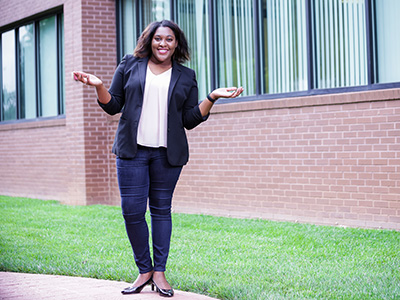
Asha Cotterell
Hi! My name is Asha, and I'm a graduate of Spelman College and a student in the Master of Science in Neuroscience (MSNS) program, class of 2017. I am a member of the inaugural class of the B.S./M.S. in Neuroscience Program, and I enrolled during my junior year at Spelman.
I am currently conducting my Master’s research in the laboratory of Alec Davidson, Ph.D., focusing on the effects of circadian rhythm disruption. I hope to have a greater understanding of the impact of circadian rhythm disruption on varying organ systems and to become more proficient in conducting research by the time I earn my MSNS degree in May 2017.
I truly believe that Morehouse School of Medicine's GEBS department, along with the Neuroscience Institute faculty, have greatly inspired me to become a better scientist. Faculty here at MSM are always so willing to help me and answer any questions that I might have about their particular research interests. Their doors are always open, and they encourage us to continue to ask questions to have a deeper understanding of neuroscience. I believes that I have created a network full of people that both support and intellectually challenge me.
I’m here if you have any questions about #RealLife: What It’s Like to Be a MSM Student!
acotterell@msm.edu
M.S. in Medical Sciences

Ashley Harrison
I am a second year Master of Science in Medical Sciences (MSMS) student here at Morehouse School of Medicine (MSM). I have aspirations of becoming a pediatric physician to minorities in underserved areas across the United States. Upon graduating from Southern University and A&M College, I was afforded the opportunity to continue my studies in the MSMS program in order to ameliorate my chances of entering medical school. The first year courses are designed to help solidify foundational and advanced concepts of the sciences while encouraging an interest in making health care more accessible to those who are deemed susceptible to health disparities. During my first year, I encountered highly qualified professors who have not only equipped me with the knowledge necessary for achievement, but also encouraged me to grow professionally and personally. While making connections with the GEBS faculty, I discovered an interest in incorporating aspects of public health in my future practice to address the many health disparities facing minorities today, especially minority children. I believe that it is up to me to continue introducing minority youth to quality medical care while encouraging them to attain higher education and achieve upward social mobility. Being at this institution has taught me that health is affected by many social determinants; thus, health equity can only be attained by addressing components in combination with biology and genetics such as environmental issues, lifestyle behaviors, and societal injustices. For these reasons, I desire to be involved in interventions aimed at providing health literacy and educational support to young minorities. By teaching and mentoring this demographic, it is hoped that they are empowered and equipped with the correct resources that lead to health equity. Being a part of the MSMS program and the MSM family has created in me a desire to become more involved in igniting change in today’s and tomorrow’s generation.
I’m here if you have any questions about #RealLife: What It’s Like to Be a MSM Student!
arharrison@msm.edu
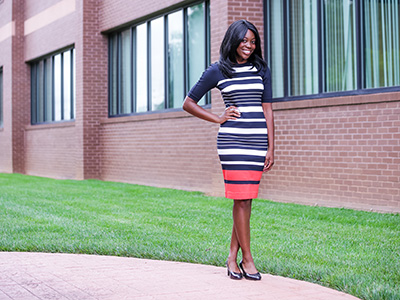
Gabrielle Richardson
I am a second year student of the Master of Science in Medical Sciences (MSMS) degree Program. Upon graduating from my undergraduate program in 2015, I didn’t feel quite ready to enter a Doctor of Medicine degree program. I wanted to join a program that would prepare me academically for my next steps in my academic journey as well as imitate the rigorous schedule of a M.D. candidate. This is what the MSMS program at Morehouse School of Medicine offers to its students. During my first year in the MSMS program, I was exposed to many different topics, ranging from Anatomy to Public Health. I was even able to participate in a class named “Bridges to Health Equity”, which focused on providing students with tools and knowledge to impact health disparities through health equity research. The class schedule was demanding, but rewarding, and I now feel much more prepared for the next steps in my journey towards becoming a physician. During the second year of the program, I will have the opportunity to study Neurobiology, Microbiology, Epidemiology, Pharmacology, Genetics, and much more. Outside of the classroom, I was able to participate in many school-wide events and research projects! I also had the opportunity to chair an annual event called “First Look: Health T.E.A.M.”, which focuses on exposing high school students in the metro Atlanta area to various health professions through informative and interactive sessions.
Ultimately, I hope to obtain a dual M.D./M.P.H. degree and serve as a physician in an underserved community. The faculty at Morehouse School of Medicine, particularly our program advisors, are incredibly supportive of all students in the MSMS program. They guide us step by step through the challenging journey of becoming a future physician. The advice, guidance, and support provided by our mentors and professors help make our goals seem more reachable. My mentors at Morehouse School of Medicine have helped me transition from undergraduate school to graduate school, taught me how to balance a rigorous workload with everyday life, and showed me how to navigate the process of reaching all of my goals. I am extremely grateful for the opportunities I have had thus far at Morehouse School of Medicine, and encourage anyone interested in medical sciences to pursue their degree through this program.
I’m here if you have any questions about #RealLife: What It’s Like to Be a MSM Student!
grichardson@msm.edu
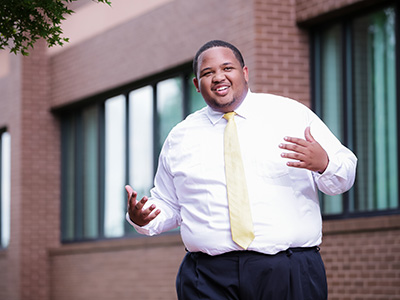
Kamron Robinson
I am a second year Master of Medical Sciences (MSMS) student. The MSMS program here at Morehouse School of Medicine has challenged me and served as a catalyst for my growth as a student, leader, and person. I remember being told by the previous class that I didn’t know how to study effectively, but that there would be an event during the semester that would make me change my study habits. Initially, I dismissed their claims, until I experienced it firsthand. Gone were the days of trying to memorize steps of biochemical reactions and certain body functions. Instead, came the skill of learning concepts on how structure, function, and biochemical reactions within the body work together. At first it was challenging, but the end result was worth the sacrifices.
My journey to the field of biomedical research and medicine began in June of 2008 when my younger cousin, Karee, was diagnosed with Idiopathic Pulmonary Hemosiderosis. At the time of her diagnosis, I remember going online and using Google to find any information I could to understand what was transpiring within her body and what I could do to help her. Unfortunately, she succumbed from complications of the disease that October. However, I refused to let that be the only event to come from her passing. Between June and October, I was at St. Louis Children’s Hospital everyday with her in the Pediatric Intensive Care Unit. I was in constant contact with physicians, nurses, and technicians as they cared for Karee and other children in the PICU. The compassion, resilience, and vast knowledge of the human body that physicians displayed daily with their patients and their patients’ families compelled me to begin the journey of becoming one.
My personal goals as a future physician are inline with MSM’s mission. I want to close the health disparity gap and increase diversity within the fields of Medicine and Biomedical Research by practicing, being accessible, and being actively involved in underserved areas. Also, I want to expose youth to medicine and biomedical research through volunteer work and mentorship. My program director, Rita Finley, Ph.D., has been very instrumental in my growth and service to the community. For example, under her guidance, three of my classmates and I chaired an event to expose local high school students to careers in medicine, biomedical research, and public health. We also volunteered at Connolly Elementary School in Atlanta by exposing the students to the field of science through age-appropriate projects. Dr. Finley, along with faculty, constantly remind and show students that service is just as an important component for our future careers as books, knowledge and tests. You won’t find a better faculty-mentor-student relationship than at Morehouse School of Medicine. I am continuously learning something new every day, something that will help save children in underserved communities from suffering the same fate as my cousin Karee.
I’m here if you have any questions about #RealLife: What It’s Like to Be a MSM Student!
krobinson@msm.edu
Ph.D. in Biomedical Sciences
Research Focus: Cancer
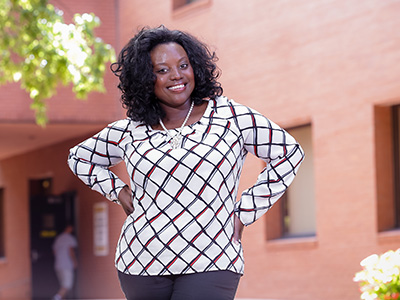
Viola Lanier
My name is Viola and I am a Doctor of Philosophy in Biomedical Sciences degree candidate. I have performed cancer research in the Microbiology, Biochemistry, and Immunology department at Morehouse School of Medicine (MSM). In 2012, I received my Master’s degree in Biomedical Research, and during my studies I signed up to take Cancer Biology as an elective course. The course director, Gary Sanford, Ph.D., immediately drew me in with engaging lectures and information that peaked my interest. I was mainly intrigued by the various ways that cancer could develop so many unique mechanisms to avoid its own destruction. Before the course ended, I made the decision to focus my studies in cancer research. I completed my Master’s thesis in the research laboratory of Ruben Gonzalez-Perez, Ph.D., and re-joined his lab to perform my dissertation research. As a Ph.D. candidate in route to completing my degree, I was able to defend my dissertation investigation, which focused on the obesity related hormone, leptin, and its effects on cells that surround the breast tumor microenvironment. Performing this type of research over the last few years has allowed me to encounter many other people doing cancer research from around the world, as well as cancer patients who are grateful for the research being done.
My goal is to reach out and give the women who are affected by cancer a bigger presence and a voice within the community. I have formed ties with a local organization in Atlanta that focuses on supporting these women and keeping them encouraged as they fight the disease. MSM has provided me with many opportunities to go beyond my community and meet those that contribute to cancer research, those that support cancer research, and those that benefit from cancer research. I am grateful for this extensive exposure and training. My drive to continue to help those affected by cancer has steadily increased, and I know it will continue to do so.
I’m here if you have any questions about #RealLife: What It’s Like to Be a MSM Student!
violalanier@gmail.com
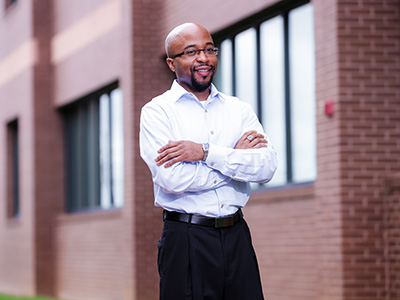
McKay Mullen
I am a second year Ph.D. in Biomedical Sciences student at Morehouse School of Medicine (MSM) currently researching therapeutic mechanisms that can be implemented to prevent cancer metastasis. My duration at MSM has been a particularly rewarding experience because I have been able to extensively study both cardiovascular diseases and cancer on a molecular level and observe the overall toll that various transcription factors have on individuals suffering from these conditions. It is through a combination of the classroom, laboratory application, data analysis, and careful interpretation of the results that I have gained a better understanding of what it means to be a scientist. I chose to study cancer in an effort to play a role in decreasing the disproportionate number of minorities who are affected by this devastating disease annually. Specifically, I have thoroughly investigated angiogenesis and studied the effects how its excessive vascular growth or, adversely, insufficient vascular development can lead to a plethora of disease states and conditions. Pursuing a Ph.D. at MSM has been essential to building upon the foundation that has been established through my experiences in the Master of Science in Biomedical Research (MSBR) program. I believe that the Ph.D. program has allowed me to propel my academic venture in a positive direction, after which I plan to ultimately teach while continuing to research cancer. I have a profound respect and admiration for the faculty and staff who have continuously displayed more genuine concern for their students’ well-being than any other institution out there, and I say that with the utmost confidence. I know undoubtedly, that it is through their invaluable guidance that I have been able to achieve academic success. I hope that someday my research will lead to the discovery novel genetic factors that could be used therapeutically to benefit the millions individuals afflicted with cancer.
I’m here if you have any questions about #RealLife: What It’s Like to Be a MSM Student!
mmullen@msm.edu
Research Focus: Cardiovascular
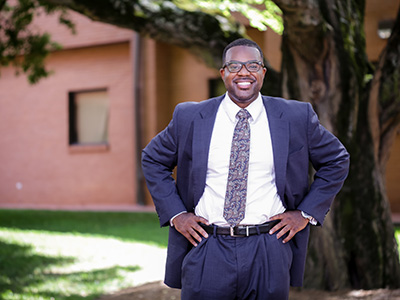
Dallas Ellis
I’m Dallas S. Ellis III, 3rd year Ph.D. in Biomedical Sciences candidate. Currently, I am a research student in the Cardiovascular Research Institute here at Morehouse School of Medicine (MSM). Conducting impactful research that makes a difference requires dedication and passion. There are many health disparities amongst minority populations, including those in cardiovascular diseases. The mission of MSM is to improve the health and well-being of individuals in underserved communities. This reflects my passion, which is to help educate minority communities on the importance of good cardiovascular health, and eliminate the disproportionate amount of health disparities in these particular communities. Here at Morehouse School of Medicine, I am able to develop myself as a researcher among a community of supportive faculty and staff who are committed to helping train the next generation of biomedical scientists. My research interest lies in finding therapeutic targets and preventive treatments for cardiovascular diseases such as hypertension and obesity. As an African-American, I have a family history of high blood pressure and other cardiovascular-related health issues. My research passion was cultivated from firsthand experiences of living in a community with individuals who are at an unfair disadvantage in health care and deal with chronic cardiovascular issues. These are individuals who I call family and friends. MSM has helped me to realize that there are many factors that play a role on one’s health, from their environment to socioeconomic status and genetics. Taking into account these factors, I understand that there must be a multi-faceted approach in facing the challenges concerning healthcare. My goal is to help solve the complex problems that are left unanswered within the realm of cardiovascular health. Morehouse School of Medicine has proved to be the institution that will help me to achieve my full potential in accomplishing these feats.
I’m here if you have any questions about #RealLife: What It’s Like to Be a MSM Student!
dellis@msm.edu
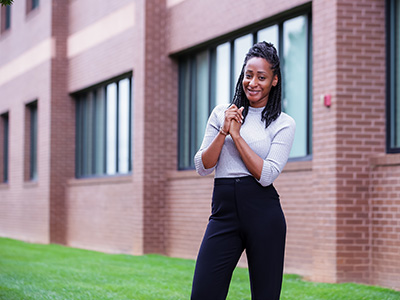
Takerra Johnson
The choice I made to focus on Cardiovascular Research was intentional. I purposely sought to be involved in an area of research that affects my community. I have witnessed those close to me deal with the side effects of hypertension and have been in the waiting room while family members had quadruple coronary bypass surgery. On the larger scale, cardiovascular disease is the leading cause of death worldwide and in most cases the disease is completely preventable. Prevention is a huge part of the task to stifle this epidemic but there is also a need for treatment. My research advisor, Dong Liu, M.D, Ph.D., focuses on manipulating your body’s own compensation mechanisms by using exosomes for the stimulation of new blood vessel formation. As the medical field moves in a direction of personalized medicine, I see the limitless potential of exosomes fitting in this new arena as an alternative therapy for ischemic diseases. I believe the overall purpose for any biomedical researcher is to in some way impact the greater population. By donating your scientific knowledge and critical thinking skills to manufacture something that can be informative to understand more about the disease or serve to treat the disease is key. My goal is to take it a step further by making sure I can cultivate an environment where basic science can be translated to the community as well as demystify the purpose of scientific research. Some people are treated for a disease and are prescribed prescriptions without knowing exactly why they are or are apprehensive about taking them. I believe they are the ones that need to understand the most so that they can better treat themselves. Morehouse School of Medicine and the GEBS faculty do a great job of providing the infrastructure where doctors and researchers can collaborate which is a dynamic start in the right direction. I simply intend on giving the patient options by doing the bench work with all hopes that it will eventually move to bedside.
I’m here if you have any questions about #RealLife: What It’s Like to Be a MSM Student!
tjohnson@msm.edu
Research Focus: HIV/Infectious Disease
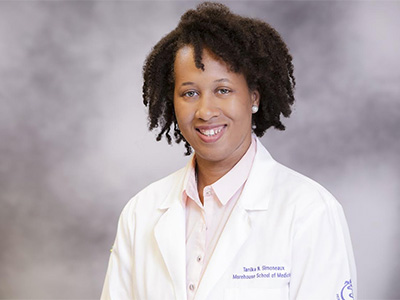
Tankya Simoneaux
My name is Tankya (pronounced Tanika) and I am a second year Ph.D. in Biomedical Sciences student here at Morehouse School of Medicine (MSM).
I conduct research in the area of Infectious Disease studying the pathogenesis of chlamydia Trachomatis in mice and cells (mice and humans). Through this focus of research I am exposed to one of my favorite systems of the human body, the immune system with genetic regulation during infection. I have always had a passion for learning science ever since grade school and I would love to run and operate my own STEM academy for underprivileged youth. I was first exposed to diseases affecting the immune system in my family and I decided that I wanted to be part of a solution to help other families and individuals by working to better understand how disease affects our immune system through research. I love that the MSM family strives to give back to the surrounding communities through various outreach programs. Partnering with different organizations at MSM, I have been able to volunteer in the STEAM (Science, Technology, Engineering, Arts, & Mathematics) program at Connally Elementary School in southwest Atlanta and many other programs that expose minority youths to science. I am truly grateful to MSM as a whole, but especially the GEBS faculty and program advisors whom I interact with on a daily basis. The GEBS faculty and program advisors are always available for us as students, and also as adults who sometimes need to have one on one counseling sessions. I especially love the fact that everyone seems to want to go the extra mile to help us be the best we can be like recommending internships, fellowships, grants, etc. Everyone at MSM is each playing a pivotal role in my development as a young scientist and I am excited about what the future holds for me because of their constant engagement in my success.
I’m here if you have any questions about #RealLife: What It’s Like to Be a MSM Student!
tsimoneaux@msm.edu
Research Focus: Neuroscience
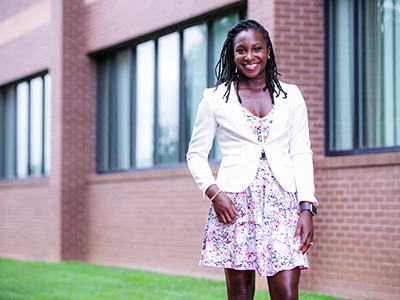
Atlantis Hill
I am a third year Ph. D. student in the Biomedical Sciences degree program currently pursuing a concentration in neuroscience. My interest in neuroscience began during my studies in my first year. The curriculum exposes you to several research areas, including Neuroscience, HIV/Infectious Disease, Cancer, and Cardiovascular. The neuroscience material intrigued me. As I explored further into the neuroscience research offered by MSM’s Neuroscience Institute, I became particularly interested in circadian research. The way that the environmental cues directly affect the internal clock to dictate discrete bodily functions amazed me, and with that I was hooked.
After completing several lab rotations in the department, I decided to join the laboratory of Alec Davidson, Ph.D. His lab focuses on the effects of shift work on immune system function. Shift work is a common schedule endured by many Americans that encompasses a work schedule outside the regular 9:00 a.m. to 5:00 p.m. time frame. Individuals that endure shift work include truck drivers, police, nurses, factory, and facility workers. My passion is to understand shift work’s effects on the immune system and diseases that develop. With family roots in a small town in Mississippi, I have seen firsthand common issues and diseases that have affected my family members that endured shift work such as diabetes, heart disease, obesity, and cancer. This encouraged me to take a special interest to work on this project to help determine the possible underlying cause of these health issues.
Our lab not only aspires to determine the correlation between immune system dysfunction and shift work schedules, but to also seek the development of improved individualized treatment, preventative measures, and policies for individuals subjected to shift work.
Morehouse School of Medicine faculty and advisors have provided me with the opportunity to work on my goals with their unwavering support. They have allowed me to explore my unique interests and understand my passion, and with their guidance, I have successfully found my area of interest. The Morehouse School of Medicine experience has been one of support, inspiration, dedication, and exposure needed to develop me as a scientist, and I am forever grateful.
I’m here if you have any questions about #RealLife: What It’s Like to Be a MSM Student!
ahill@msm.edu
